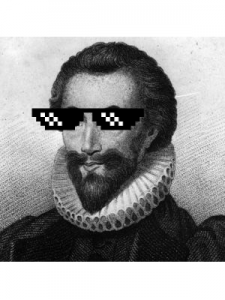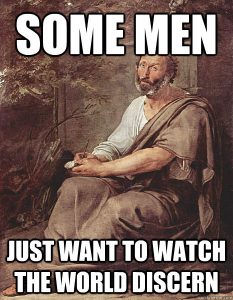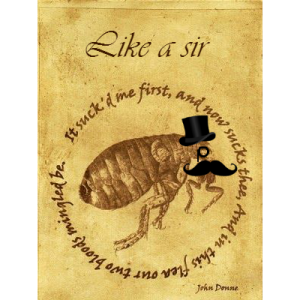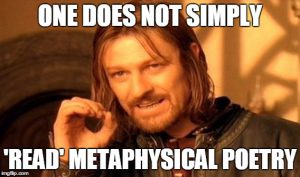Metaphysical poetry… well known for complex, extended metaphors, abstract ideas, and poets who believe love poems always get the girl.
Though the most famous metaphysical poems date back to around the 17th century, the idea behind these poems was derived from the metaphysics branch of philosophy, which deals with the principles of things, especially abstract concepts such as being, substance, knowing, cause, identity, time, and space. This metaphysical theory goes back all the way to ancient Greece, and the phrase “ta meta ta phusika”, or “the things after the Physics”, from some of Aristotle’s works concerning the nature of things without physical scientific explanations… basically, he came up with a new branch of “science” to delve deeper in ideas that were not physical or natural.
Metaphysical poems, in a sense, are full of unnaturalness… even though many of them use analogies and metaphors to explain very natural feelings or concepts. Johann Wolfgang von Goethe put it nicely… metaphysical poems delve into, “The unnatural, that too is natural.”
So what’s the meaning of all this natural-unnaturalness?
The famous metaphysical poets of the 17th century used the concept of metaphysics to explore philosophical ideas such as human thoughts, love, religion, and morality, created metaphors to explain or simplify these ideas, and used reason and paradox to explain them.

John Donne(right) is one of the most well known. In his poems, he discussed psychology, spirituality, sexuality, and his themes and form marked a departure from traditional poetry. Donne is now known as a great English writer, but for quite some time, his poetry went out of style. It wasn’t until the 20th century that people began to commonly read them again, at the same time as the Modernist movement. Well Donne, good sir.
One of his most famous poems, The Flea, was basically written just to try and convince someone to go out with him, and used the image of flea which had bitten them both to symbolize their potential love… very romantic.
“Mark but this flea, and mark in this,
How little that which thou deniest me is;
It sucked me first, and now sucks thee,
And in this flea our two bloods mingled be”
Excerpt from The Flea
Though metaphysical poets sometimes didn’t instantly get recognition for their poems, their work continued to be studied and revered for intricacy and originality centuries after.
George Herbert, Andrew Marvell, Henry Vaughn, Abraham Cowley, Richard Crashaw were some of the other well known metaphysical poets, known for poems of “emotional and intellectual ingenuity, characterized by conceit or “wit”.” They wrote poems of personal or intellectual complexity and concentration, and used similes and metaphors galore. Unlike the traditional poems of the time period, metaphysical poets tended to focus on analyzing feeling instead of just expressing and describing it… meditations on human thought. Many also used bold literary devices, such as irony or paradox, which were quite uncommon at the time. They were basically the hipsters of poetry, using ideas and literary devices before they were cool.
“Metaphysical poetry is concerned with the whole experience of man, but the intelligence, learning and seriousness of the poets means that the poetry is about the profound areas of experience especially – about love, romantic and sensual; about man’s relationship with God – the eternal perspective, and, to a less extent, about pleasure, learning and art.”
-S.K. Paul (Reassessing British Literature: Part 1)
Many metaphysical poets used wit, irony and wordplay to argue a point hidden underneath the surface of the poem… often making it hard for a reader to understand the meaning at first glance. The method was not new (as stated previously, the idea of metaphysics goes back all the way to ancient Greece), so why wasn’t metaphysical poetry popular before the 17th century? The metaphysical poets who gained the most fame modernized the idea and incorporated originality and relatability for readers of the time. The metaphysical conceits used, were usually meant to be striking and far-fetched, to create a distance between or striking incompatibility of objects compared, creating a sort of paradox or irony.
In Andrew Marvell’s To His Coy Mistress, he combines an “old poetic conceit (the persuasion of the speaker’s lover by means of a carpe diem philosophy)” with vivid imagery and short, rhyming couplets, modernizing it to make it relatable to readers. The poem’s descriptions seem timeless, which is very interesting, since time is a major theme throughout it, and there are even theories that Time is The Coy Mistress…
“Had we but world enough and time,
This coyness, lady, were no crime.
We would sit down, and think which way
To walk, and pass our long love’s day.”
Excerpt from To His Coy Mistress
All of these poets used the idea of metaphysics and new, bold literary devices to create a new trend in the history of English literature, using a mix of modern (for the time period) speech, intellectual analysis of very human ideas, and striking imagery. If you want to learn more about these poets or read more of these intriguingly awesome poems, check out the links below!
More History!
More Poetry!
- Holy Sonnets-Death, Be Not Proud by John Donne
- The Pulley by George Herbert
- The World by Henry Vaughan
“A Brief Guide to Metaphysical Poets.” Poets.org. Academy of American Poets, 19 May 2004. Web. 28 Jan. 2017.
Craik, Henry. “Samuel Johnson (1709-1784). Metaphysical Poets. Vol. IV. Eighteenth Century. Henry Craik, Ed. 1916. English Prose.” Samuel Johnson (1709-1784). Metaphysical Poets. Vol. IV. Eighteenth Century. Henry Craik, Ed. 1916. English Prose. Bartleby.com, n.d. Web. 27 Jan. 2017.
Hall, Michael L. “Metaphysical Poetry and History.” The Sewanee Review 101, no. 4 (1993): 596-603. Web. 28 Jan. 2017. http://www.jstor.org/stable/27546783.
“History of English Literature.” History of English Literature: Metaphysical Poetry. Literaturewise.in, 9 July 2015. Web. 27 Jan. 2017.
“Metaphysical Poets | Glossary Terms | Poetry Foundation.” Poetry Foundation. Poetry Foundation, n.d. Web. 28 Jan. 2017.
“Metaphysical Poets.” Metaphysical Poets. Ed. Poetrysoup.com. Arczis Web Technologies, Inc., n.d. Web. 01 Feb. 2017.
Moore, Andrew. “Studying the Metaphysical Poets.” Studying the Metaphysical Poets. Universalteacher.org, 2000. Web. 30 Jan. 2017.
Paul, S. K. Books.google.com. Vol. 1. New Delhi: Sarup & Sons, 2007. Print.
The Editors of Encyclopaedia Britannica. “Metaphysical Poet.” Encyclopaedia Britannica. Encyclopaedia Britannica, Inc., 30 Jan. 2009. Web. 30 Jan. 2017.




